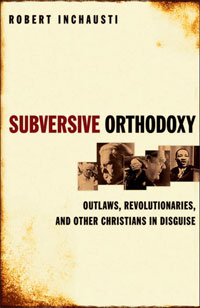Book Notes
 Robert Inchausti, Subversive Orthodoxy; Outlaws, Revolutionaries, and Other Christians in Disguise (Grand Rapids: Brazos, 2005), 219pp.
Robert Inchausti, Subversive Orthodoxy; Outlaws, Revolutionaries, and Other Christians in Disguise (Grand Rapids: Brazos, 2005), 219pp.
One of the best things going in Christian publishing today is Brazos Press, an imprint of the otherwise Calvinist and conservative Baker Book House. Under the guidance of editor Rodney Clapp, Brazos is marketing genuinely creative, provocative. and broadly Christian authors who want to think and write with timely relevance at the intersection of contemporary culture and Christian faith. Robert Inchausti, professor of English at California State Polytechnic University in San Luis Obispo, for example, explores the cultural critiques of twenty thinkers who, whatever their many diverse differences, all took great exception to the received wisdom of their day. Dorothy Day led the way in social justice, as did Martin Luther King. Jacques Ellul and Ivan Illich offered big-picture critiques. Walker Percy and Boris Pasternak were novelists and, as such, two of our best theologians (none of the twenty figures he explores are theologians in the technical sense). Inchausti organizes these twenty subverters of conventional wisdom under five main chapter headings: the soul under siege, the novel as countermythology, antipolitical politics, macrohistorical criticism, and the role of the Christian mysteries in the life of the modern mind. I found these categories rather broad, and something of an artificial stretch to place radically diverse thinkers under each theme. Further, trying to tackle so many seminal intellectuals means he can devote only five to ten pages to each. The result felt choppy. GK Chesterton and Goethe in four pages each? King and McLuhan get about a dozen pages each, but these were "long" by the book's standards. In such short chapters I found it difficult to enter into the thought of the many subjects about which I was ignorant. If you do not already know Pasternak, William Blake, or Rene Girard, for example, this book might not be the best introduction to their thought. Still, it is a fine contribution for a Christian intellectual to tackle and honor the contributions of these titans and their efforts to map the journey of Christian faith in the real world.


